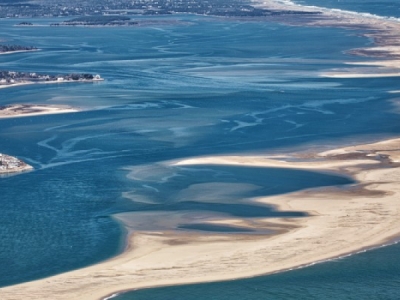
Posted on June 20, 2019
CHATHAM — A Minister’s Point property owner whose land is threatened by erosion is keeping up the legal fight against dredging in Chatham Harbor.
Essentially denying an earlier appeal by property owner Gerald Milden, the Massachusetts Department of Environmental Protection issued a superseding order of conditions late last month that would have allowed dredging to go forward in an area inside the North Inlet. But on June 12, hours before the statutory window closed, Milden’s attorney requested an adjudicatory hearing, triggering a review process that could last a year or longer. During that time period, the town is unable to dredge in the harbor area.
The news comes as a blow to commercial fishermen who work from Aunt Lydia’s Cove. With their busy season just beginning, fishermen are unable to enter or leave the harbor except at peak high tide thanks to shoaling just inside the North Inlet. With extensive shoaling now blocking the old harbor entrance by the lighthouse, the North Inlet is the only way in or out of Chatham Harbor for deep-draft boats like commercial fishing vessels and Coast Guard rescue boats.
Milden’s attorney, Paul Revere III of Centerville, could not be reached for comment. Milden has argued previously that prior dredging of the harbor caused changes in tidal patterns that accelerated erosion near Minister’s Point. During severe coastal storms last year, a portion of Milden’s seawall collapsed, causing part of his yard to slump into the harbor.
Last August, the town received emergency permission from the Chatham Conservation Commission to dredge the bottleneck inside the North Inlet. Though that dredging did not take place because of logistical challenges, the town later sought to add the area to its comprehensive dredging permit, which would have allowed dredging there at a later time. Milden appealed that decision, arguing that the commission’s order of conditions did not offer sufficient protections for nearby waterfront properties. In its May 30 superseding order, DEP denied that appeal, prompting Milden’s attorney to request the adjudicatory hearing. It is likely that DEP will grant the request for the hearing, which represents the final avenue of appeal within the state regulatory process.
“As long as the appeal was filed within the required time frame and was filed by a party involved in the case at the local level, then a hearing will have to be scheduled,” DEP spokesman Edmund Colletta wrote in an email to the Chronicle. “However, as part of the process leading up to any hearing, the hearing officer encourages the parties involved to further discuss the possibility of reaching an agreement on the case.”
According to information on the DEP website, the adjudicatory hearing will be conducted by the Office of Appeals and Dispute Resolution, which appoints experienced attorneys to serve as neutral hearing officers. The officers typically hold a series of hearings and conferences designed to facilitate a settlement, and can then recommend a final decision to the DEP commissioner, who can adopt it, reject it or modify it. Such a decision can then be subject to judicial review.
In a separate process, Milden has filed suit in Barnstable Superior Court under the town’s wetlands bylaw, alleging that the conservation commission didn’t properly consider the potential impacts that dredging projects might have on shoreline properties when issuing its order of conditions, and that it should have referred the application to the Cape Cod Commission as a Development of Regional Impact. That suit remains pending.
The appeals represent just one obstacle to any dredging of Chatham Harbor. The town still needs to obtain a state Chapter 91 permit and water quality certifications, which apparently remain on hold during the adjudicatory hearing process. The town would also need to procure the services of a dredge, either from the county, from a private firm or through a cooperative effort with surrounding towns. Town officials have also made it clear that any dredging near the North Inlet could provide short-lived benefits, since shoaling in that area can occur rapidly.
The town has contracted with Applied Coastal Research and Engineering and the Provincetown Center for Coastal Studies on a study of coastal processes in the harbor, and early findings indicate that the shoaling at the bottleneck is unlikely to clear on its own. While Milden blames the collapse of his revetment on earlier dredging in Aunt Lydia’s Cove, the study seems to indicate that the increased currents around Minister’s Point are more likely related to the evolution of the barrier beach offshore.
Source: capecodchronicle.com





